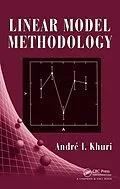Given the importance of linear models in statistical theory and experimental research, a good understanding of their fundamental principles and theory is essential. Supported by a large number of examples, Linear Model Methodology provides a strong foundation in the theory of linear models and explores the latest developments in data analysis.After
Autorentext
Andre I. Khuri is a Professor Emeritus in the Department of Statistics at the University of Florida in Gainesville.
Inhalt
Linear Models: Some Historical Perspectives. Basic Elements of Linear Algebra. Basic Concepts in Matrix Algebra. The Multivariate Normal Distribution. Quadratic Forms in Normal Variables. Full-Rank Linear Models. Less-Than-Full-Rank Linear Models. Balanced Linear Models. The Adequacy of Satterthwaite's Approximation. Unbalanced Fixed-Effects Models. Unbalanced Random and Mixed Models. Additional Topics in Linear Models. Generalized Linear Models. Bibliography. Index.
